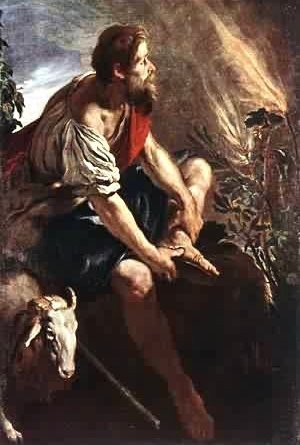Worship
in Exodus
By
Stephen Terry
 “Do not come any closer,
God said. Take off your sandals, for the place where you are standing is holy
ground.” Exodus 3:5, NIV
“Do not come any closer,
God said. Take off your sandals, for the place where you are standing is holy
ground.” Exodus 3:5, NIV
The opening
chapters of the book of Exodus represent a low point in the history of God’s
people. From calling upon the name of the Lord in the early chapters of
Genesis, they had come, after 400 years in
Entering
the country as free men during Joseph’s time, they had devolved into slaves
under Egyptian taskmasters. God had
endowed each of His children with a divine destiny. He had called the sons of God to be more than
mere slaves whose daily existence had become little better than the animals
around them.
The Bible tells us, “What is man that you are mindful of him, the
son of man that you care for him? You made him a little lower than the heavenly
beings and crowned him with glory and honor. You made him ruler over the works
of your hands; you put everything under his feet: all flocks and herds, and the
beasts of the field, the birds of
the air, and the fish of the sea, all that swim the paths of the seas.” Psalm
8:4-8, NIV
The Egyptians worshipped the
very creatures they were created to have dominion over. They honored animals
more than the people that they enslaved. As sons of men, they had willingly
exchanged their divine destiny for a humble and depraved existence. Man,
created for great things, had chosen instead to dwell in the gutter. The
Egyptians had chosen to look no higher than their own desires for purpose and
meaning. As those desires became more and more degenerate, so did their sense
of purpose. After four centuries of
living with the Egyptians, the Israelites had spiraled downward as well.
They had forgotten the lessons
of Lot and
Hundreds of years later, He
would have to pull
Strangely, God’s first words to
Moses were not about deliverance, but He spoke instead of reverence. He
commanded Moses to remove his sandals because he was standing on holy ground.
This would indicate that the greatest need for His people at that point in
history was to restore a reverence for the holy. Perhaps this is because man
was made in God’s image and whenever man is degraded, his concept of God
becomes degraded as well. If man is lowered to the point of worshipping
animals, then God seems of little more significance than an animal Himself.
Mankind needed to understand
God’s true holiness before he could understand his own special destiny. This is
why if is so very difficult even today, for a man or woman to rise to his or
her true place in creation until there is first an encounter with the person of
Jesus. Once Jesus is allowed into the life and heart, all else becomes obvious
and willingly the “reborn” person casts aside that which defaces God’s image
and seeks to rise to their true place in God’s loving plan.
A vast multitude responded to
God’s call to come out of
Things today are no different.
Even when Jesus walked in
With
so few finding the path of life, should we wonder that it is necessary for God
to first introduce His people to reverence? Lot went astray in
Some
might feel that Jesus inoculates us against this. But the Israelites lived with
the very presence of God in their camp in a pillar of cloud by day and fire by
night, yet they went astray. While the power of God thundered from Sinai, they
chose to make a golden idol in the image of a calf. Having thus degraded the image of God, they
immediately reverted to the degraded partying and licentious behavior that the
Egyptians considered worship. Any idea of reverence had gone out the window. No
wonder God wanted to start all over. (See Exodus 32)
Just
as God called his people from
God
calls His people from this confused image of man and God. He wants to restore
them to their divine destiny. Like in ancient
This Commentary is a Service of Still
Waters Ministry
![]()
If you
do not have the current Bible
Study Quarterly, you may purchase one by clicking here and typing the word
"quarterly" into the search box.